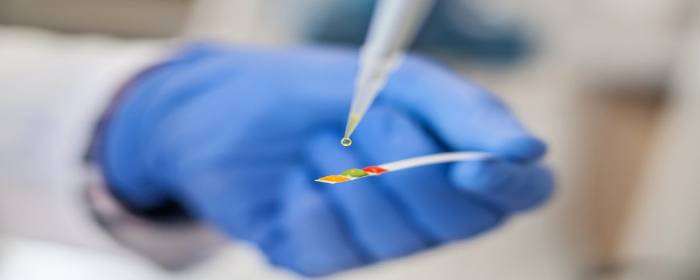
by admin | Dec 17, 2018 | Aesthetics, Stem Cell Therapy
Researchers
have observed that the pH inside of certain stem cells affects their ability to
proliferate and differentiate. These cells include mesenchymal stem cells and
pluripotent stem cells, all of which have important applications in
regenerative medicine. It is therefore important that pH be optimized to ensure
that these stem cells can proliferate and differentiate so
that they can be as useful as possible when utilized for therapeutic purposes.
A recent review, published in Current Problems in Dermatology, explored the importance of pH to stem cell function as well as the factors that influence pH. According to the authors, a protein known as the sodium hydrogen exchanger regulates intracellular pH and impacts both the proliferation and differentiation of different types of stem cells. When pH is changed, either within the cell or outside the cell – where the cell is exposed to the change in pH – stem cell functions includingmaintenance, self-renewal, and pluripotency are altered.
The effect of pH in stem cells is highly relevant for skin conditions and therefore for the practice of dermatology. According to the reviewers, research on how the sodium hydrogen exchanger and pH levels affect skin stem cells (also known as epidermal stem cells) and their behavior could enable the discovery of new interventions to improve the use of stem cells in skin therapies. This research would be particularly relevant for skin conditions like melanoma, psoriasis, and wound healing because the movement and proliferation of stem cells are keyissues in these conditions.
Reference: Charruyer,
A. & Ghadially, R. (2018). Influence of pH on skin stem cells and their
differentiation. Current Problems in
Dermatology, 54, 71-78.

by admin | Nov 26, 2018 | Adipose, Aesthetics, Stem Cell Therapy
Although all living organisms experience aging, scientists have relatively little understanding of why aging occurs. The leading theories on aging suggest that living creatures sustain damage to their DNA through exposure to ultraviolet light, toxins, or even the day-to-day stresses of using oxygen for our cellular metabolism. Whatever the cause, this DNA damage causes cells to 1) repair themselves, 2) die, or 3) enter a middle state called senescence where they remain alive, but simply stop participating in active living. If cells successfully repair themselves, they don’t perceptibly age. If cells enter senescence or die, the body shows signs of aging.
The bottom line: If we can help cells repair themselves, and replace dying and senescent cells, we can slow or even reverse aging. All of this may be possible through the careful use of stem cells.
As we age, stem cells lose the ability to renew themselves, to become other cells (differentiate) and to replace aged cells. Older stem cells secrete less and less of the substances that help the cells around them stay young and healthy. Not only do our regular cells age, but so do our stem cells. This is perhaps the strongest point for using stem cells to reverse the visible signs of aging.
Adipose-derived stem cells are one of the most promising sources of stem cells for anti-aging and regenerative medicine. They are easy to harvest by liposuction to remove stem cells along with fat cells. In addition, adipose-derived stem cells have the potential to become all cell types in the skin; namely fat cells, skin cells, muscle cells, and fibroblasts, and others. Even if the stem cells do not become other cells, they strongly secrete cytokines and other substances that help renew and replenish the cells around them.
While additional research is required, adipose-derived mesenchymal stem cells are currently being tested in clinical trials to treat a number of age-related conditions. Indeed, clinicians are currently using the stem cells to perform a number of aesthetic procedures such as breast or buttock augmentation, hand rejuvenation, as facial dermal fillers, and to promote and restore hair growth. As we learn more about how to use the power of stem cells in aesthetic procedures, we will be able to better address the visible signs of aging in the face and body.

by admin | Nov 12, 2018 | Adipose, Aesthetics
Adipose mesenchymal stromal cells, or adipose stem cells, were discovered in 2001 and have since been heavily researched for their potential use in plastic surgery. The abundance of research and the positive clinical findings have resulted in these cells being increasingly used in plastic surgery and have helped plastic surgery move to the forefront of regenerative medicine. A recent review has summarized research into adipose mesenchymal stromal cells and their applications in plastic surgery.
One of the things that make adipose mesenchymal stromal cells so valuable for plastic surgery is that these cells can overcome challenges observed with other stem cells. Much of the reason for the ability of adipose stem cells to provide better outcomes than other stem cell types are their regenerative properties. The stromal vascular fraction that includes all adipose tissue cells except the adipocytes is becoming used more and more for grafting and replacing fat grafting because of its great potential for tissue regeneration. In addition to grafting, adipose stem cells are showing promise in wound healing and recovery from tissue damage and scarring.
Unlike some other stem cells types that are more challenging to harvest, adipose stem cells can be relatively easily retrieved by performing liposuction, which requires only local anesthesia and can be completed without causing scarring. Now that the potential of adipose stem cells is being realized, the authors of the recent review suggest that new protocols should be developed and solidified to help define how exactly these cells can reliably be used in regenerative medicine generally – and in plastic surgery specifically. As more research is conducted and clinical applications are observed through case studies, these protocols will evolve, and our ability to use adipose stem cells to treat patients will improve and expand.




 St. Petersburg, Florida
St. Petersburg, Florida
